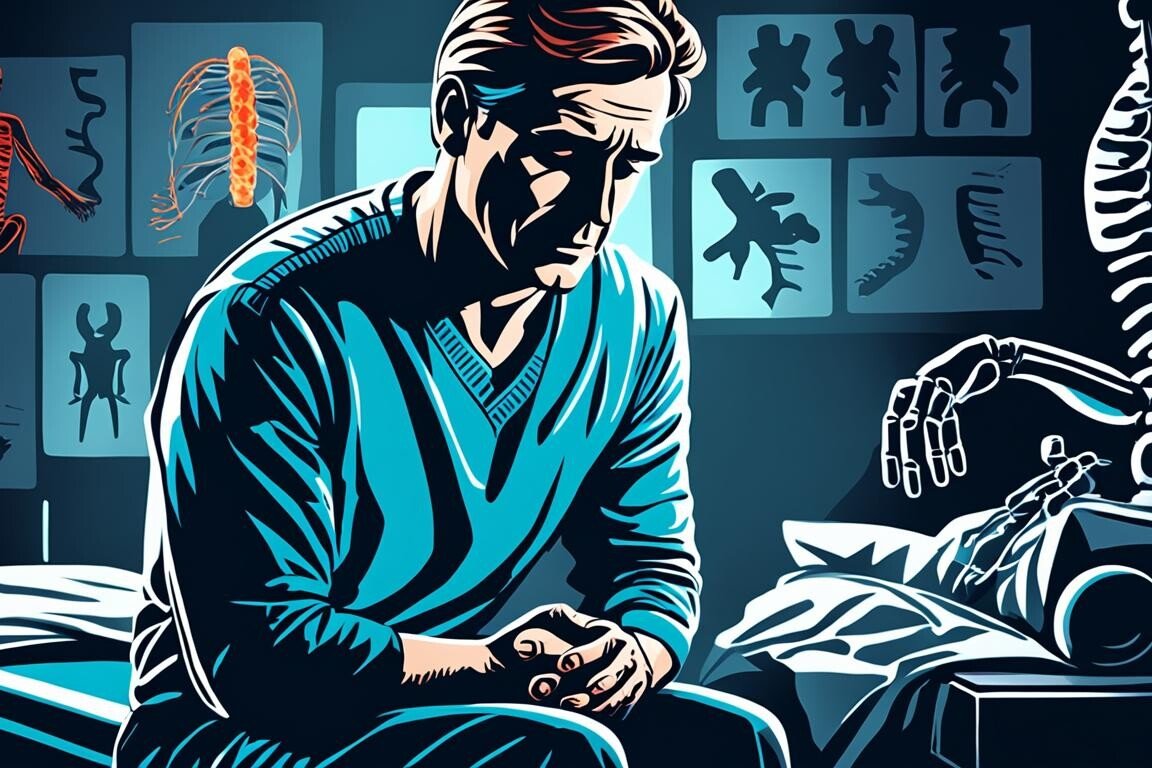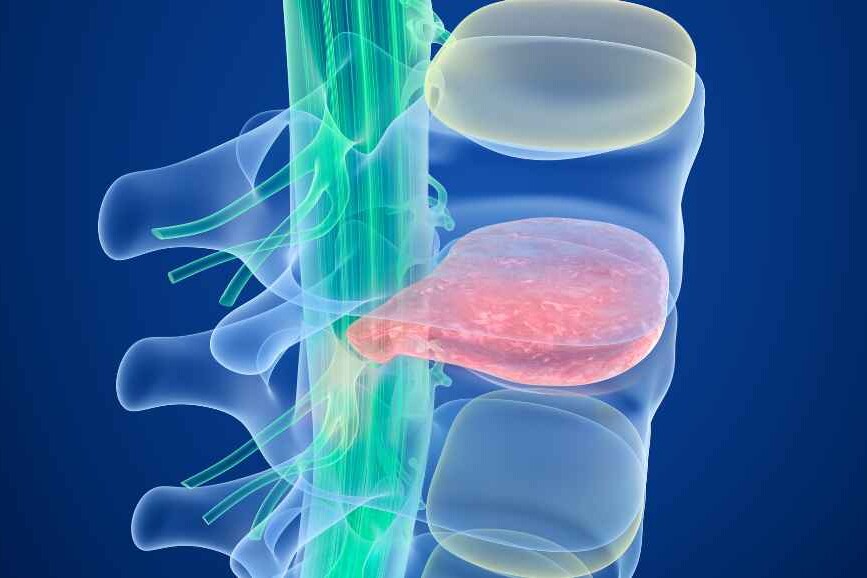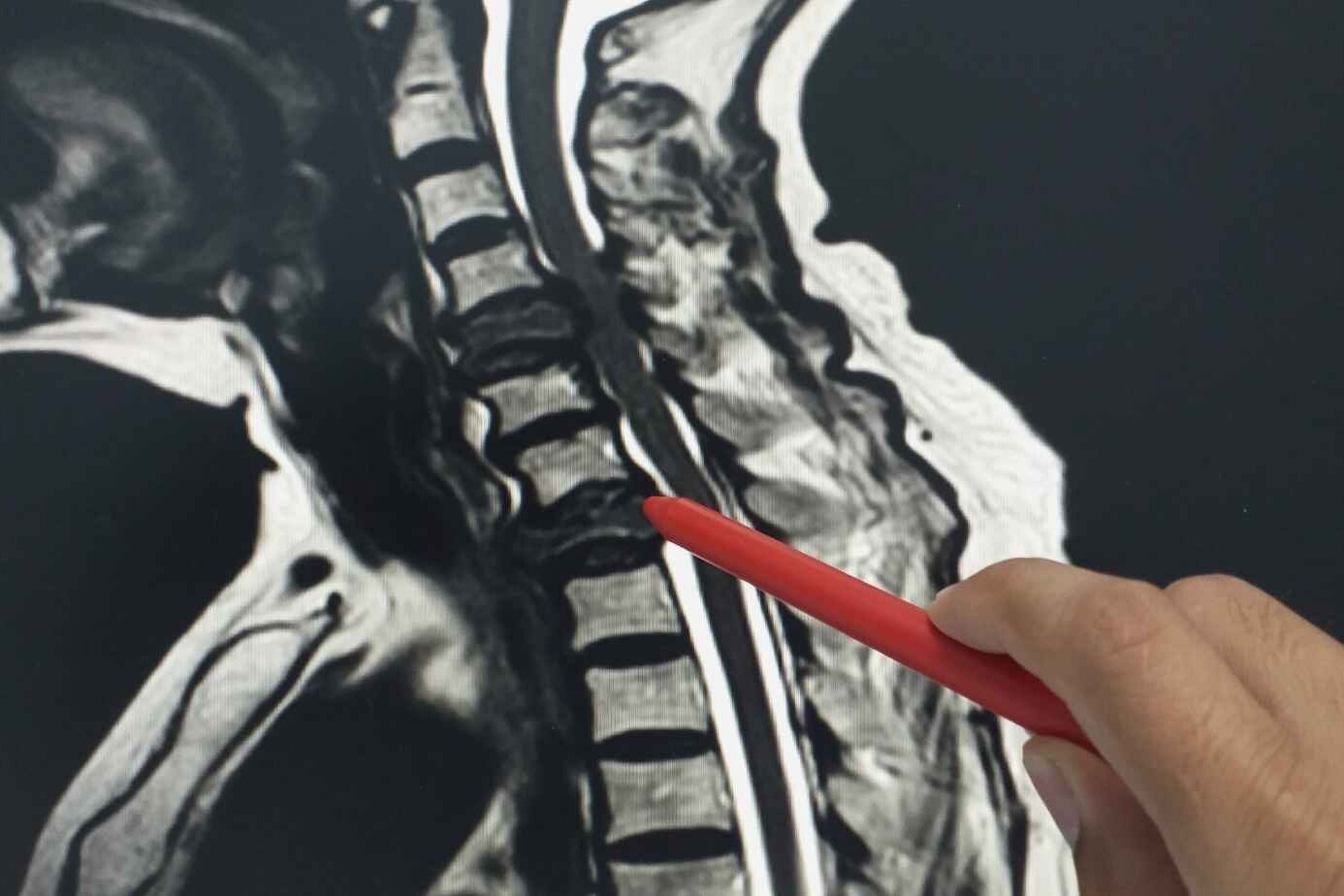If you’re feeling the pain of a slipped disc, you’re not alone. Many people suffer from slipped discs, which can really affect your life. Luckily, there are many ways to ease the pain and get you moving again.
This guide covers both non-surgical and surgical treatments for slipped disc pain. You’ll learn about medicines, physical therapy, epidural injections, and how to take care of yourself. We’ll also talk about how to prevent future problems and when to see a doctor. This guide aims to give you the knowledge and tools to manage your back pain and find lasting relief.
Not all slipped discs cause pain, and most back pain isn’t serious. With the right treatment and a proactive approach, you can beat the pain of a slipped disc. You can get back to living an active, pain-free life.
Table of Contents
ToggleUnderstanding Slipped Discs
A slipped disc, also known as a herniated or prolapsed disc, is a common spinal issue. It happens when the rubbery cushion between the spine’s vertebrae bulges or ruptures. This can put pressure on the nerves, leading to pain, numbness, and weakness. Knowing what causes slipped discs helps with prevention and management.
What is a Slipped Disc?
The spine has vertebrae, and between each one is a disc that absorbs shock. These discs have a tough outer layer and a soft, gel-like core. When a disc herniates or slips, the inner core comes out through the outer layer. This puts pressure on the nerves and causes symptoms.
Causes of Slipped Discs
Several factors can lead to a slipped disc, including:
- Age: As we get older, our spine’s discs lose water and become more likely to slip or herniate.
- Injury: Trauma, like a car accident or a fall, can cause a disc to rupture or bulge.
- Poor posture and improper lifting techniques: Stress on the spine from bad posture or lifting wrong can lead to disc herniation.
- Degenerative disc disease: This is when the discs wear out over time, making slipping more likely.
Knowing what causes slipped discs is key to preventing and managing them. By addressing these factors, people can lower their risk of this painful condition.
Symptoms of a Slipped Disc
If you have a slipped disc, you might notice symptoms that affect your daily life. Common signs include back pain, leg pain (sciatica), muscle weakness, and numbness or tingling in the affected limb.
The symptoms depend on where the slipped disc is and how much it presses on nerves. For example, a slipped disc in the lower back might cause radiating leg pain, muscle weakness, and numbness or tingling in your legs and feet. A slipped disc in the neck could lead to neck pain, shoulder pain, and tingling or weakness in your arms and hands.
Some people might have a herniated disc without noticing it at. But as it gets worse, symptoms can become more severe, making it hard to move and enjoy life.
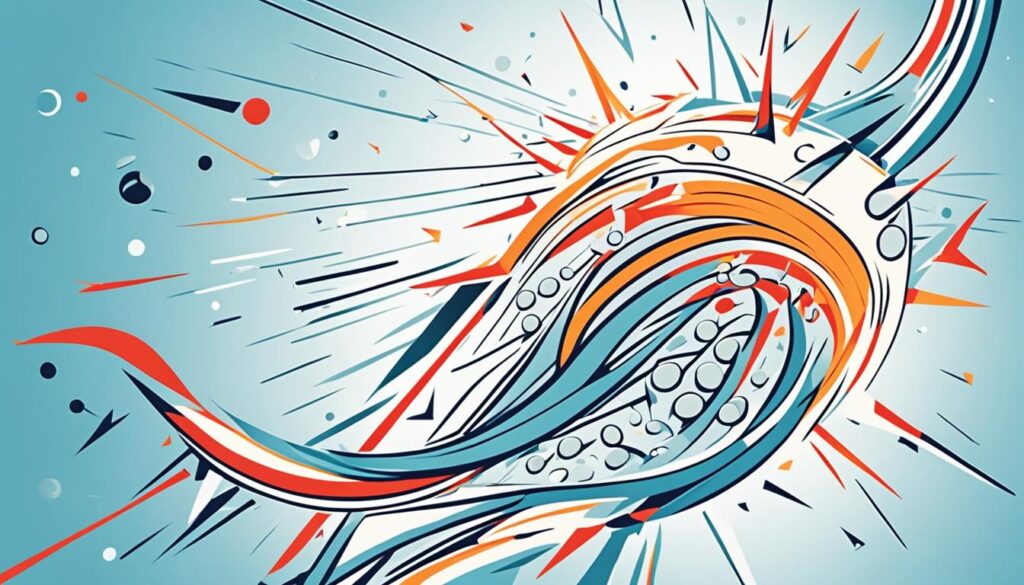
If you’re feeling any of these slipped disc symptoms, sciatica pain, radiating leg pain, muscle weakness, numbness and tingling, see a doctor right away. Working with a healthcare professional can help ease your pain and stop it from getting worse.
Importance of Rest and Activity Balance
Finding the right balance between rest and activity is key when you have a slipped disc. Bed rest can help at first, but too much rest can make muscles stiff and weak. On the other hand, doing too much too soon can make things worse.
Why Rest is Crucial
Rest is vital in the early stages of a slipped disc. It lets the body heal and reduces swelling. This helps the disc move back into place. If you push yourself too hard, you might take longer to recover or even make things worse.
Staying Active for Recovery
When the pain goes down, start moving gently and do low-impact exercises. These keep muscles from getting too small and help blood flow better. Doing things like low-impact exercises and gentle stretches is good. Just make sure you don’t do too much to avoid needing more rest.
Moving around is very important when you’re getting better. The right mix of rest and activity helps you heal faster and get back to normal sooner.

Medications for Slipped Disc Pain Relief
Managing pain from a slipped disc often involves using medications. Over-the-counter (OTC) anti-inflammatory drugs like acetaminophen, ibuprofen, and naproxen can ease inflammation and discomfort.
Over-the-Counter Pain Relievers
OTC anti-inflammatory drugs are good for treating slipped disc pain. They should not be taken for more than 10 days without a doctor’s advice. This is because they can raise the risk of heart issues or bleeding inside the body.
Prescription Medications
If the pain is severe, your doctor might prescribe stronger drugs. These could be opioid pain relievers, muscle relaxants, or medications for nerve pain. While these can help, they come with more side effects and should be used with a doctor’s watchful eye.
Always follow your doctor’s advice when taking any medication for a slipped disc. Using a mix of medications, physical therapy, and lifestyle changes can give you the best relief.

Physical Therapy and Exercises
If you’re struggling with a herniated disc, physical therapy can really help. A skilled therapist will create a plan just for you. This plan includes stretching, strengthening exercises, and spinal decompression techniques.
Benefits of Physical Therapy
Physical therapy is great for treating herniated discs. Your therapist will focus on the exact area that hurts. They’ll use exercises and stretches to make you more flexible and strong.
This is key for supporting your spine and preventing future problems.
Herniated Disc Exercises
Doing certain exercises can really help with herniated disc pain. Press-ups, backward bends, and core exercises can ease the pressure on the disc. For neck pain, try moving your chin towards your chest and side-to-side ear movements.
Hamstring stretches can also help if your disc is in the lower back or legs. But always listen to your body. If an exercise hurts, stop doing it.
Your physical therapist will guide you through a safe program. They’ll help you recover from your herniated disc.
Epidural Steroid Injections
If other treatments don’t help, your doctor might suggest an epidural steroid injection. This method involves putting a corticosteroid medication near the spinal nerves. It aims to lessen inflammation and pain. Epidural injections can offer temporary relief and help you do physical therapy better.
These injections can be given up to three to six times a year. They’re meant to last three to six months or longer. But, there are some risks like bleeding, infection, and nerve damage. These risks are very low if a skilled healthcare professional does the injection.
Side effects of epidural steroid injections can include mild pain at the injection site, temporary increase in usual pain, flushing, trouble sleeping, higher blood sugar, and headaches. These shots are usually given by pain management doctors, physiatrists, and interventional radiologists. The Hospital for Special Surgery, ranked No. 1 in orthopedics for 14 years, is one place where they’re given.
There are changes in how epidural steroid injections are used before spine surgery. Lumbar epidural steroid injections are often used for radicular pain. This type of pain affects about 9% to 25% of people every year.
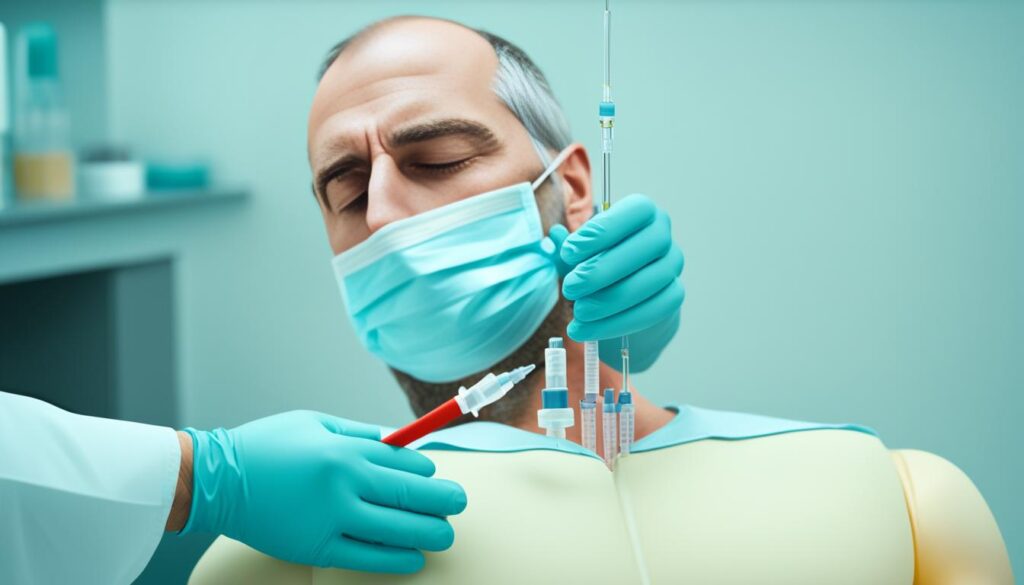
Slipped Disc Pain Relief
If you’re feeling the pain of a slipped disc, there are natural ways to help. You can try hot or cold therapy, or even gentle massage. These methods can ease your symptoms and help you heal.
One easy way to ease slipped disc pain is with hot and cold therapy. An ice pack can reduce swelling and numb the pain. A heating pad can relax muscles and boost blood flow. Switching between hot and cold can give you more relief.
Massage therapy is another great option for slipped disc pain. It can relax muscles, improve blood flow, and ease tension. Make sure to see a licensed massage therapist for the best results.
Other ways to help with slipped disc pain include:
- Acupuncture: This ancient Chinese practice can help stimulate the body’s natural pain-relieving mechanisms and promote healing.
- Chiropractic care: A chiropractor can perform spinal adjustments and other techniques to help realign the spine and reduce pressure on the affected disc.
- Yoga and stretching: Gentle, low-impact exercises can help improve flexibility, strengthen the core, and reduce stress on the spine.
Always talk to your healthcare provider before trying new remedies or treatments. They can give you advice that fits your needs and ensures safety.

Surgical Options for Severe Cases
Some slipped discs need surgery, especially if other treatments don’t work. Surgery options include discectomy, spinal fusion, and artificial disc replacement. These are chosen when other treatments don’t help enough.
Discectomy
Discectomy removes the damaged part of the disc. This herniated disc surgery takes pressure off the nerve and reduces pain. It’s a minimally invasive procedure with a low risk of complications.
Spinal Fusion
Spinal fusion might be needed to stabilize the spine. It fuses two or more vertebrae together. This prevents further disc problems and eases pain. Recovery from spinal fusion takes longer than from discectomy.
Artificial Disc Replacement
For some, artificial disc replacement is an option. It replaces the damaged disc with an artificial one, keeping the spine’s natural movement. This surgery is less invasive than spinal fusion.
The right surgery depends on your slipped disc’s severity and your health and lifestyle. Always talk to a spine specialist to find the best treatment for you.
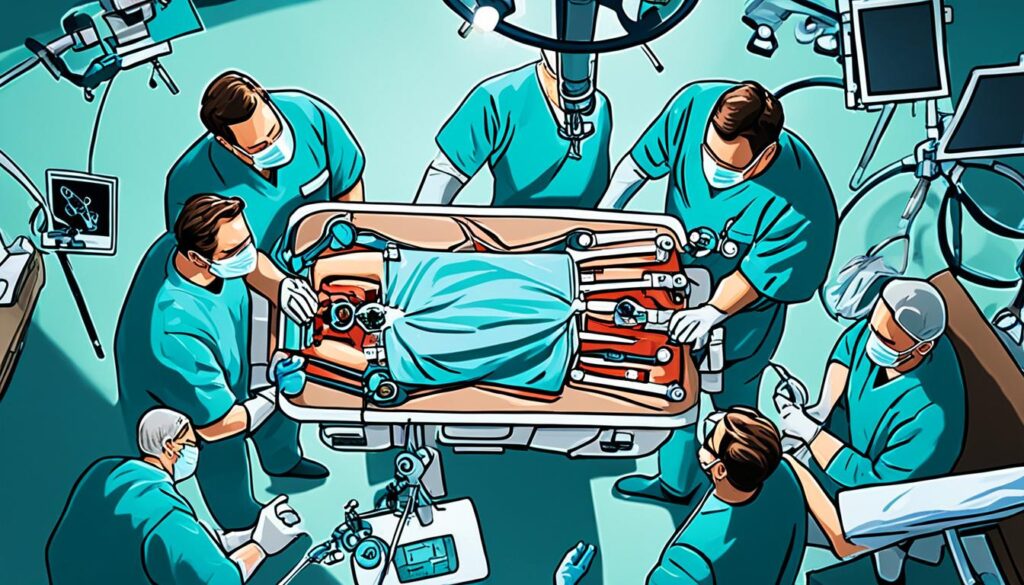
Self-Care Tips for Herniated Discs
Keeping a good posture and lifting safely are key to avoiding and handling slipped discs. By adding these habits to your daily life, you can lower the chance of future problems and ease current pain.
Proper Posture
Having a straight spine is vital for your discs. Always be aware of your posture when sitting, standing, or doing activities. Keep your shoulders back, head up, and weight evenly spread. Don’t slouch or hunch, as it can harm your back.
Lifting Techniques
Use your legs, not your back, when lifting heavy things. Bend at the knees and keep your back straight. Lift the item close to your body. Don’t twist your body, as it can cause a slipped disc. For more slipped disc prevention, use ergonomic habits and safe lifting at work and home.
Focus on activities that are good for your back to manage and prevent herniated disc pain. Talk to a healthcare expert for advice on keeping your spine healthy and avoiding future problems.
Preventing Future Slipped Discs
To avoid getting a slipped disc, focus on keeping a healthy weight and stop smoking. Being overweight and smoking can make disc problems worse. By changing your lifestyle, exercising, and keeping good posture, you can protect your spine.
Maintain a Healthy Weight
Keeping a healthy weight helps lessen the stress on your spinal discs. Too much weight, especially around your belly, puts more pressure on your spine. This can lead to disc problems. Use diet and exercise to manage your weight and prevent slipped discs.
Quit Smoking
Smoking is a big risk for needing more surgery for disc problems. Quitting smoking helps your spine by improving blood flow, reducing inflammation, and keeping tissues healthy. This can lower your risk of getting a slipped disc or having it happen again.
Along with a healthy weight and quitting smoking, regular exercise, proper lifting, and good posture help prevent slipped discs. These changes can protect your spine and lower the risk of pain and disability from a slipped disc.
When to Seek Medical Attention
If you have a slipped disc, it’s important to see a doctor quickly if things get worse. Look out for signs like muscle weakness, trouble with your bowels or bladder, or pain that’s really bad. These could mean you need urgent care to avoid nerve damage or other serious problems.
A 2011 study found that waiting over six months to see a doctor about a herniated disc didn’t help much. In fact, waiting too long can cause more harm than good. So, it’s best to get medical help right away for a herniated disc.
Here are signs you should see a doctor or a spine specialist:
- Worsening or severe pain that doesn’t improve with rest
- Significant muscle weakness or loss of sensation in your legs or feet
- Difficulty controlling your bladder or bowels
- Balance issues or difficulty walking
Getting a diagnosis and treatment quickly is key for dealing with herniated disc issues. Your doctor might use scans like CT or MRI to figure out what’s causing your pain. Then, they can suggest the best treatment, which could be medical care or surgery, as explained in this article.
Don’t hesitate to get medical help if you’re showing severe symptoms or if your condition is getting worse. Acting fast can prevent nerve damage and help you recover better.
Conclusion
Managing slipped disc pain requires a full approach that includes rest, medicine, physical therapy, and sometimes surgery. By knowing the causes, symptoms, and treatment options, you can help yourself recover and avoid future problems.
Working with your healthcare team is key to managing a slipped disc. They can help create a plan that fits your needs. This plan might include over-the-counter pain relievers, exercises, making changes to your work setup, and finding ways to reduce stress. These steps can help you live without pain and stay active.
Learning about your condition and taking an active part in your care can greatly improve your recovery. With the right mix of rest, therapy, and prevention, you can beat the challenges of a slipped disc. This will help you get back to feeling good overall.
FAQ
What is a slipped disc?
What are the common causes of slipped discs?
What are the main symptoms of a slipped disc?
Why is it important to find the right balance between rest and activity?
What types of medications can help alleviate slipped disc pain?
How can physical therapy help with slipped disc treatment?
What is the purpose of epidural steroid injections for slipped discs?
What are some self-care strategies for slipped disc pain relief?
When is surgery considered for slipped discs?
How can you prevent future slipped discs?
When should you seek medical attention for a slipped disc?
See a doctor if your symptoms get worse, you have severe pain, muscle weakness, or trouble controlling your bowels or bladder. These could mean a serious issue that needs quick medical help.
Source Links
- The Ultimate Guide to Slipped Disc Treatment – Delhi Pain Management Centre
- Slipped (Herniated) Disc: Symptoms, Causes, and Effects
- Slipped Disc: Exercises for Pain Relief
- 6 Things to Know about Slipped Discs in the Lower Back
- Slip disc treatment at home | Dr. Amit Sharma
- Slip Disc: Exploring Types, Risk Factors, and Progressive Treatment
- Slipped Disc Exercises for Pain Relief and Treatment | Metropolis TruHealth
About The Author

This article is medically reviewed by Dr. Chandril Chugh, Board-Certified Neurologist, providing expert insights and reliable health information.
Dr. Chandril Chugh is a U.S.-trained neurologist with over a decade of experience. Known for his compassionate care, he specializes in treating neurological conditions such as migraines, epilepsy, and Parkinson’s disease. Dr. Chugh is highly regarded for his patient-centered approach and dedication to providing personalized care.
→ Book a consultation to discover which remedies suit your needs best.

